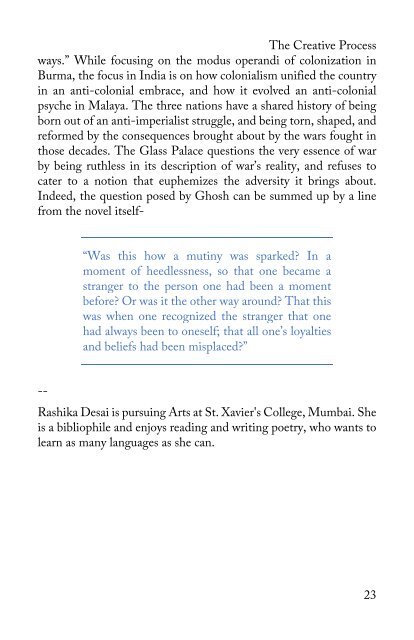The Creative Process: The Arts of War (Spring 2017)
The Creative Process is The Mumbai Art Collective's flagship magazine.
The Creative Process is The Mumbai Art Collective's flagship magazine.
Create successful ePaper yourself
Turn your PDF publications into a flip-book with our unique Google optimized e-Paper software.
<strong>The</strong> <strong>Creative</strong> <strong>Process</strong><br />
ways.” While focusing on the modus operandi <strong>of</strong> colonization in<br />
Burma, the focus in India is on how colonialism unified the country<br />
in an anti-colonial embrace, and how it evolved an anti-colonial<br />
psyche in Malaya. <strong>The</strong> three nations have a shared history <strong>of</strong> being<br />
born out <strong>of</strong> an anti-imperialist struggle, and being torn, shaped, and<br />
reformed by the consequences brought about by the wars fought in<br />
those decades. <strong>The</strong> Glass Palace questions the very essence <strong>of</strong> war<br />
by being ruthless in its description <strong>of</strong> war’s reality, and refuses to<br />
cater to a notion that euphemizes the adversity it brings about.<br />
Indeed, the question posed by Ghosh can be summed up by a line<br />
from the novel itself-<br />
“Was this how a mutiny was sparked? In a<br />
moment <strong>of</strong> heedlessness, so that one became a<br />
stranger to the person one had been a moment<br />
before? Or was it the other way around? That this<br />
was when one recognized the stranger that one<br />
had always been to oneself; that all one’s loyalties<br />
and beliefs had been misplaced?”<br />
--<br />
Rashika Desai is pursuing <strong>Arts</strong> at St. Xavier's College, Mumbai. She<br />
is a bibliophile and enjoys reading and writing poetry, who wants to<br />
learn as many languages as she can.<br />
23



